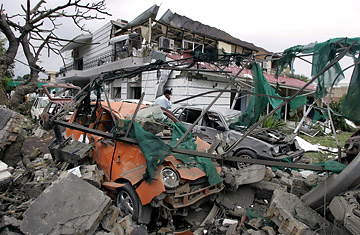
The scene outside the Danish embassy in Islamabad, Pakistan, after a bomb explosion on Monday.
A large car bomb exploded outside the Danish embassy in Islamabad today, killing as many as eight people and injuring dozens. The attack, the second in the capital since terrorists targeted a pizza restaurant popular with foreigners in March, raises questions about ongoing peace negotiations between the civilian government and militants residing in the lawless tribal lands along the border with Afghanistan.
The bomb, which was heard a mile away, left a massive crater just in front of the embassy gate. The front of the building was sheared off by the force of the blast; windows shattered in homes throughout the well-guarded residential neighborhood. Investigators say it is too early to conclude whether the car, which was packed with an estimated 44 pounds of explosives and carried false diplomatic plates, was detonated by remote control, a timer or by a suicide bomber. So far there has been no claim of responsibility.
Danish embassies and companies throughout the Muslim world, including Pakistan, have been the target of attacks and protests since 2005 when newspapers in Denmark ran satirical cartoons that Muslims say insult Islam. Several prominent Danish newspapers reprinted the controversial cartoons in February. It was an act in solidarity with one of the cartoonists, who was the subject of an assassination plot for his image of the prophet with a bomb in his turban. Cartoonist Kurt Westergaard says his intent was to illustrate how religion was exploited to justify terror, but Muslims complain it portrays the prophet as a terrorist.
Today's bombing in Islmabad "was a very symbolic attack to show a reaction against the cartoons," says terrorism analyst Amir Rana, Director of the Pak Institute For Peace Studies. However, other observers dismiss the link, pointing out the three-month lag. "The blasphemy cartoons issue is really very critical for every Muslim, but it is a matter of fact that these days no one was discussing it," says Khalid Alvi, a former professor of Islamic studies at the International Islamic University of Islamabad. "The [ordinary] Muslim cannot imagine killing innocent people just to take revenge. It is not only un-Islamic, but also unacceptable and should be condemned by Muslims themselves."
Today's attack took place just as the newly elected government is finalizing a controversial peace deal with Pakistani Taliban leader Baitullah Mehsud. The Administration of U.S. President George Bush has said the negotiations, which will allow Mehsud a certain degree of autonomy in the tribal areas in exchange for a pledge to cease attacks in Pakistan, gives the militants far too much leeway, particularly because the agreements fail to prohibit attacks on U.S. and NATO forces fighting in Afghanistan. Terrorist attacks against coalition forces in Afghanistan were up 50% in April, compared to the same month last year. That, says outgoing NATO commander Dan McNeil, is a result of the negotiations. "Over time, when there has been dialogue, or peace deals, the incidents have gone up," he told journalists in Kabul. "What you see right now is the effects of no pressure on the extremists and insurgents on the other side of the border." Today's bombing would indicate that the agreements may fail to prevent further attacks in Pakistan as well.
Alvi believes other factors may be in play. Says the professor, "Maybe some elements who did not like the truce agreement are trying to sabotage the process." While Mehsud may be the most notorious militant leader in Pakistan today — both Pakistani security forces and the CIA have accused him of orchestrating the suicide attack that killed former Prime Minister Benazir Bhutto last December, which he denies — the country is rife with rival terrorist groups that have utilized the ungoverned tribal areas to pursue different agendas. Mehsud's stated goal is to establish Islamic law in Pakistan; attacking coalition forces on the Afghan side of the border is only tangential to his plans. Other groups operating in the area are focused on Kashmir. Meanwhile, foreign fighters, such as Chechens, Uzbeks and Arabs, are intent on overthrowing governments in their native lands.
The last attack on an embassy in Islamabad took place in 1995, when al-Qaeda militants bombed the Egyptian embassy. It's a worrying parallel, says Rana, who has noted similarities in today's attack in terms of size, planning and methodology to a recent bombing in Lahore that was also attributed to al-Qaeda. Mehsud and al-Qaeda have certainly worked together in the past, he says, but "sometimes they have different targets and agendas. At this point I don't think Mehsud would do something like this; it only serves to destabilize the government with which he wants to make a deal."
Al-Qaeda, on the other hand, may simply want to prove that it still on top of the terrorist game, no matter what kind of deals its offshoots pursue. Past peace deals between the Pakistani government and militants, notably in 2005 and 2006, were accompanied by similar al-Qaeda-linked attacks, such as the car bombing of the U.S. consulate in Karachi in March 2006.
International condemnation of the negotiations will most certainly increase after today's bombing, but Rana doesn't think the government will back down on its plans for a peace deal. President Musharraf's military solution to the extremist insurgency, in which he lost nearly 1,000 soldiers, was also seen as a failure. His unpopular pursuit of what is largely regarded as Washington's war on terror led to his party's drubbing in the recent parliamentary elections.
The new government feels that it has no choice but to take a different approach, one that buys time while it consolidates power. "The peace deal is not the primary concern," says Rana. "It is the political crisis going on. They can't afford to create another front in the tribal areas right now." The problem is, al-Qaeda may have just opened another front for them. With reporting by Ershad Mahmud/Islamabad
